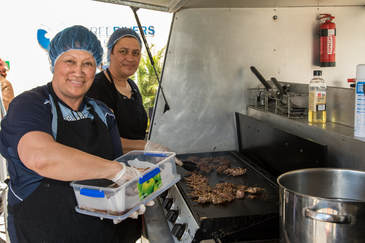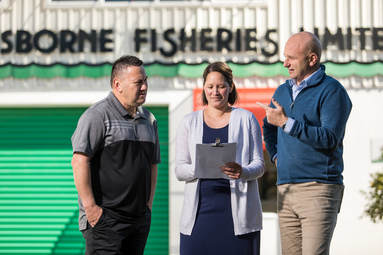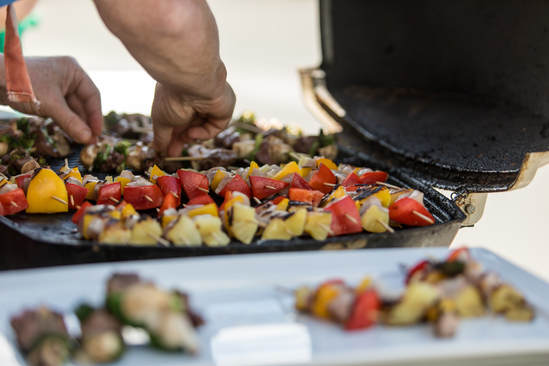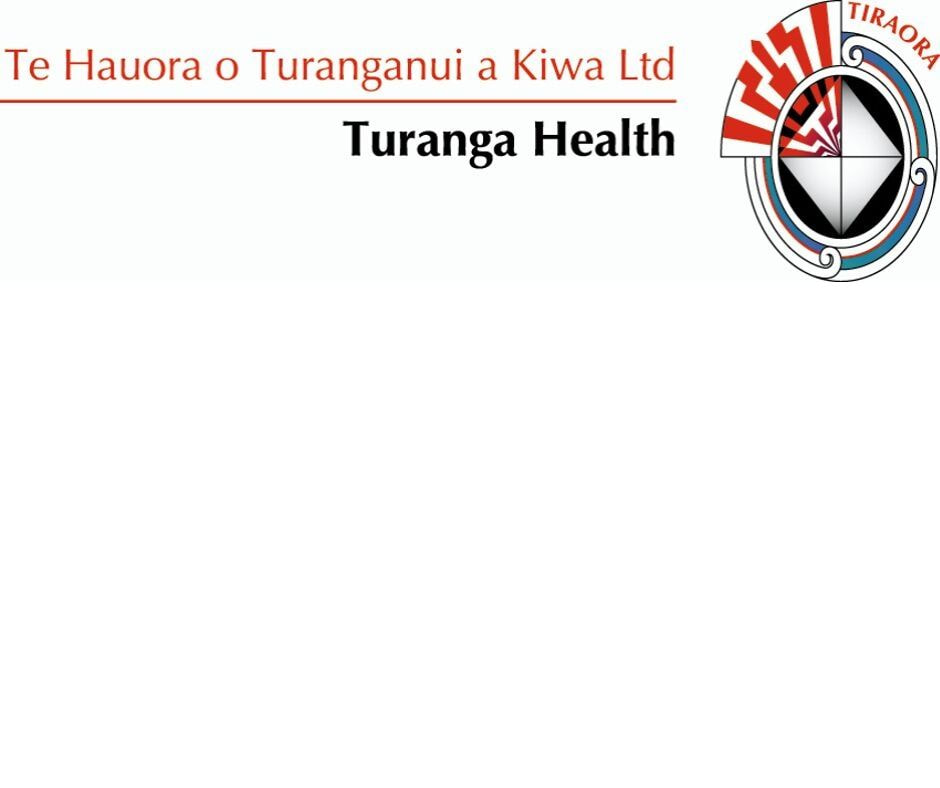 THEY might be all about healthy living but they don't mind a bit of healthy competition as well! Staff from Tūranga Health and Three Rivers Medical in November donned aprons and took up spatulas to take part in their semi-annual Cook-Off. This year, the challenge was to cook tasty skewered kebabs on the barbecue, using ingredients from chicken, beef and vegetables to tofu or haloumi cheese, and (uncooked) fruits. The playing field may, at times, have been a little uneven . . . Tūranga Health unleashed an early advantage with their appetiser of fresh kinaand oysters served with homemade rēwena bread. However, Three Rivers' succulent Whangara Farms flagship beef was eventually too good for Turanga Health's seafood bonanza, and the medical team took away the win. “We wouldn't say they cheated . . . but their appetisers were a force to be reckoned with,” laughed Three Rivers co-owner and education co-ordinator Dr Fergus Aitcheson. Dr Aitcheson and Turanga Health events and programmes co-ordinator Dallas Poi agreed that, while the healthy competition between both organisations is well received by staff members, the atmosphere and message on the day is what sings true: “Healthy kai and nutrition can be fun and whanau can get a lot of enjoyment out of cooking together.” And as Tūranga Health events and programmes co-ordinator Dallas Poi pointed out, “nobody can cheat anyway because there aren't any rules!” Three Rivers chief executive and co-owner Ingrid Collins says that as well as encouraging healthy eating among whānau and service users, the cook-off is a chance for the two organisations to celebrate their ongoing relationship. “We've worked well together since we launched in 2012 and to this day Tūranga Health is represented at our doctors' peer review meetings where they share input and ideas,” she said. “It's an important way to encourage healthy living beyond the doctors' rooms.” For the service users who went along for the big Cook-Off, their involvement went further than simply getting a tasty, healthy feed. As well as being able to vote for the grand winners of the 2018 Cook-Off between the two organisations, they also went into the draw to win the day's prize of a Gascraft barbeque (taken home by Eddie Evans). And service users were questioned about their own secret food tricks, which may come into play for next year's competition.
3 Comments
 STELLA Rihari was busy studying towards a planned career as a social worker when everything changed. “As I got closer to completing my degree I had two placements with Tūranga Health's mental health team,” she says. “It wasn't an area of practice I’d considered but I found the opportunity to help give disadvantaged people a voice to be deeply rewarding. When a position came up I jumped at it.” Stella still gets to use her degree. “There's a lot of crossover from social work and the focus on biculturalism has been really useful. I'd long felt passionate about Māori health and this is such an important part of that.” As a kaiāwhina in Tūranga Health's busy mental health team, the former teacher gets out and about helping whānau according to needs identified in their specially-tailored support plan. “We're there for support if they need to be hospitalised, but it’s mainly about helping in their day-to-day lives, whether that be getting to a doctor's appointment or doing their shopping.” “Some of our whānau are more independent than others but all seem to value just knowing that we care,” she says. “They know that we are there, that we’ll work alongside them doing everything we can to help them lead independent, meaningful lives.”  Turanga Health is hitting the great outdoors with it’s rohe-wide physical activity and health programme Tū Pakari. For the city-based sessions the Tūranga Health team has devised activities that can be done at stunning locations around town. “We love getting out there but if it's raining we just do the session at the Tūranga Health gym,” says physical activity kaiawhina Shane Luke. Town-based session locations include Titirangi Kaiti Hill, Waiweherua (the meeting of the three rivers), Elgin’s Blackpool Park, and Oneroa (Midway Beach). And since the sessions are suitable for all, Luke hopes whānau will bring their young ones along for the ride. Tū Pakari sessions in rural areas continue 6pm on Tuesdays at Patutahi Hall (with Bernie Semau), Muriwai Marae (with Daiminn Kemp) and Mangatu Marae (with Luke Bradley); Wednesdays (Te Karaka Sports Ground with Hotorene Brown); and Thursdays (Patutahi Hall with Daiminn Kemp). Turanga Health service delivery manager Dwayne Tamatea says it's great to whanau getting out and about to exercise . “We were stoked to see the numbers of people at the Te Karaka and Muriwai sessions increasing earlier this year, and we’re hoping everyone returns and brings a friend or whānau member for the summer sessions.”  THE team at Tūranga Health know they are making a difference – they see good results every day – but now they’re drilling deep to provide evidence that what they do works, and why. Tūranga Health was this year one of six primary health providers from around the country chosen to be a part of the Health Quality and Safety Commission's best practice initiative, Whakakotahi. The only iwi health provider in the bunch, Tūranga Health is using the opportunity to zoom in on its Tū Mahi programme, where on-the-job health checks are offered to workplaces to improve and prevent health issues. “For us, Whakakotahi is not about introducing something new, it is about achieving quality assurance by really looking close and understanding the essence of what we are here to do,” says Tūranga Health chief executive Reweti Ropiha. “What we're using is a powerful tool of discipline that not only ensures our clients are getting the best of the best, but also future-proofs Tūranga a Health as a high-quality provider of primary care.” With support from Commission Advisor Jane Cullen, the Gisborne initiative has been driven by the Tūranga Health team and their Tūranga Mahi Workplace Wellness programme for the research phase of Whakakotahi. The Tū Mahi Workplace Wellness programme offers a range of services including heart checks, flu vaccinations, smoking cessation and other wrap around services all year round to primary industry workers. “What we saw, was that some whānau could be better served if we extended our consults into the home,” says team member Dallas Poi. “So, during a workplace visit our team might identify employees, for example, with a potential heart problem. Following up by visiting the person at home means we can also offer wrap-around services they may not have had access to had we not taken that extra step.” It might include services like a Healthy Homes assessment, or registration with a lifestyle programme or, if there are young ones in the home, support from the Tamariki Ora Well Child programme. “What we have identified is that getting the whānau involved means there is a better chance of success in achieving a good health outcome,” says Dallas Poi. As an integral part of the Whakakotahi project team, Ms Poi works closely with the nurses doing follow ups on each home visit to assess its effect and ensure that the kaupapa is applied and is based on robust evidence. “But at this stage we are already optimistic that home visits will become standard, so we can improve on what is already a successful workplace programme,” she says. The Health Quality and Safety Commission has invited Tūranga Health along as its co-presenter at next year's National Rural Health Conference. And that dovetails nicely with Mr Ropiha's ambition to see Tūranga Health excel in providing services that can be adapted by health providers nationwide. “Our aim is to make sure that there is real, evidence-based rigour to all of our programmes to ensure they are sustainable,” he says. “We are in this for the long term, and that's why it was important for us to really zoom in and look closely at the what, the why and the how of everything we do.” In te reo Maori the word “whakakotahi” literally means unity and under the initiative of that name Turanga Health has combined with the Health Quality and Safety Commission to ensure there is rigorous, evidence-based backing to all of its programmes. Image caption: Tūranga Health’s Dwayne Tamatea and Dallas Poi, and Gisborne Fisheries chief executive Salve Zame discuss the potential of Whakakotahi to help improve and prevent health issues for staff at Gisborne Fisheries. |
Media Releases
Email us if you want to receive our media releases. Archives
February 2024
|



